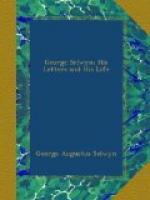(205) Charles Lennox, third Duke of Richmond (1735-1806). He was a Whig of strong liberal opinions. In 1782 he joined Lord Rockingham’s Cabinet as Master General of the Ordnance. He resigned office when Fox and North came into power in 1782. In 1783, on the fall of the Coalition Ministry, he joined Pitt’s first Administration, from which time his opinions grew more conservative. In 1795 he gave up office but continued to give an independent support to Pitt. Richmond’s handsome person, high station, love and patronage of the fine arts, and his political ambition and capacity, combined to make him one of the first men of the time.
(206) Edward, Earl Ligonier, died 1782, of the Irish peerage, and a general in the English army. His grandfather was a native of France, and a Huguenot. His uncle was Marshal Lord Ligonier.
(207) John Wilkes (1727-1797). He first made use of the power of the press in politics. In 1782 his election for Middlesex Was finally pronounced by Parliament to be valid.
(208) Benedict Arnold (1741-1801). Arnold, after brilliant military services on behalf of the revolted Colonists, had entered, in 1780, into negotiations with General Clinton to give up to the English commander the position of West Point with its stores. Major Andre was sent to him on behalf of the English general. Arnold’s treachery was discovered, and he had barely time to escape to a British sloop. In 1782, after being given the rank of Brigadier-General in the English army, he came to London.
(209) Sir Grey Cooper, died 1801, one of the Secretaries of the Treasury from 1765 to 1782, and again under the Coalition Ministry. Noted for his administrative ability and accurate knowledge on questions of finance.
The correspondence must again be interrupted to continue the narrative of the parliamentary struggle. On receipt of the King’s answer to the Address which, it has already been stated, was carried without a division, Conway moved another hostile resolution, to the effect that those who should advise the further prosecution of the American war should be considered enemies of the country. This was also carried without a division, but Lord North still remained in office.
On March 8th, therefore, the attack was renewed, Lord John Cavendish bringing forward a resolution which concluded with the words, “That the chief cause of all these misfortunes has been the want of foresight and ability in his Majesty’s Ministers.” The Government were still able to depend on their place-holders, and averted a direct defeat by carrying the order of the day by ten votes.
The Opposition was as obstinate in assault as the King—for it was virtually he against whom the attacks of Fox and his friends were being pressed—was in defence, and on the 15th of March a direct resolution of want of confidence was only defeated by nine votes.




